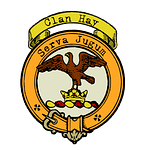Welcome back to "A Clan A Day Podcast," brought to you by bagtownclans.com. I'm your host, Colin MacDonald, and today we're exploring the fascinating history of Clan Forsyth, a family whose origins stretch back to the turbulent times of medieval Scotland. Whether their roots are Norse or Celtic, as some theories suggest, the Forsyths have long played a significant role in Scottish history, with tales of loyalty, resilience, and remarkable achievements.
The story of Clan Forsyth begins as early as the 13th century. Some suggest that the name "Forsyth" may derive from the Gaelic Fearsithe, meaning "man of peace," while others speculate that the family may have Norse origins. One such legend speaks of a Norseman named Forsach, who settled in France before his descendants found their way to Scotland. However, the first concrete historical record of the Forsyth name in Scotland appears in 1296 when William de Fersith signed the infamous Ragman Roll. This document required Scottish landowners and nobles to swear allegiance to Edward I of England after Scotland’s military defeat.
Despite this early submission to the English crown, the Forsyths soon became fervent supporters of Scottish independence. After the rise of King Robert the Bruce, Osbert de Forsyth, a descendant of William, distinguished himself during the Wars of Scottish Independence. Osbert fought at the Battle of Bannockburn in 1314, a decisive Scottish victory, and was later rewarded with land in Stirlingshire. This marked the Forsyths’ transition from a relatively obscure family to an integral part of the Scottish nobility.
By 1368, Osbert’s son had been appointed as constable of Stirling Castle, further solidifying the clan’s close ties to the Scottish crown. Forsyths would continue to serve in prominent roles within the royal household, including acting as king’s macers, or royal messengers. These prestigious positions indicated their rising influence within the Scottish court.
Clan Forsyth’s power and influence continued to grow throughout the 14th and 15th centuries. David Forsyth of Dykes, a key figure in the clan’s history, acquired lands in Lanarkshire and claimed descent from the Norman Fronsoc family of France. The castle at Dykes became the seat of the Forsyth family, and although it was demolished in the 19th century, its significance in Forsyth history remains.
The clan’s fortunes remained tied to the Scottish crown, and like many noble families, they were swept up in the political turmoil of the 16th century. Several Forsyths lost their lives at the Battle of Flodden in 1513, fighting for King James IV against the English. Among them were David Forsyth of Dykes and his relative, Alexander Forsyth of Nydie. Their deaths at Flodden marked a turning point for the clan, but the Forsyths would continue to serve Scotland in various capacities over the following centuries.
One of the most notable Forsyths in the 17th century was William Forsyth, a distinguished horticulturist who moved to London to study botanical gardens. Appointed Chief Superintendent of the Royal Kensington Gardens in 1784, William's contributions to horticulture left a lasting legacy, and he became famous for developing a unique method of promoting plant growth, particularly in trees. His work earned him royal favor and cemented the Forsyth name in the annals of British botanical history.
While the Forsyths were achieving great things in the fields of horticulture and science, other branches of the family continued to hold significant positions in Scottish society. Some Forsyths represented their regions in the Scottish Parliament, while others contributed to the intellectual and theological life of the country. In the 19th century, Peter Taylor Forsyth became a notable theologian whose writings left a profound impact on Christian thought.
But the history of Clan Forsyth is not without its challenges. In 1672, when Charles II instituted the Public Register of Clans, the Forsyths failed to register their clan, resulting in the loss of their official recognition as a Scottish clan. For over 300 years, Clan Forsyth remained unrecognized, their chiefdom left vacant. It wasn’t until 1978, on St. Andrew's Day, that this situation was rectified. The Lord Lyon King of Arms officially recognized Clan Forsyth once again, appointing Alistair Forsyth of that Ilk as the clan’s chief. This momentous occasion marked the rebirth of Clan Forsyth, reconnecting the diaspora of Forsyth descendants scattered around the world.
Today, Clan Forsyth continues to honor its rich heritage, with members of the clan contributing to various fields, from science and business to art and literature. The Clan Forsyth Society actively promotes the clan’s history and culture, ensuring that the legacy of this ancient family endures.
From their early days as landowners and warriors to their contributions to science and horticulture, the Forsyths have left an indelible mark on Scottish history. Their story is one of resilience, loyalty, and the enduring power of family.
Thank you for joining us on this journey through the history of Clan Forsyth. Be sure to tune in tomorrow for another episode of "A Clan A Day Podcast." I'm Colin MacDonald, and as always, Go n-éirí an bóthar leat.











